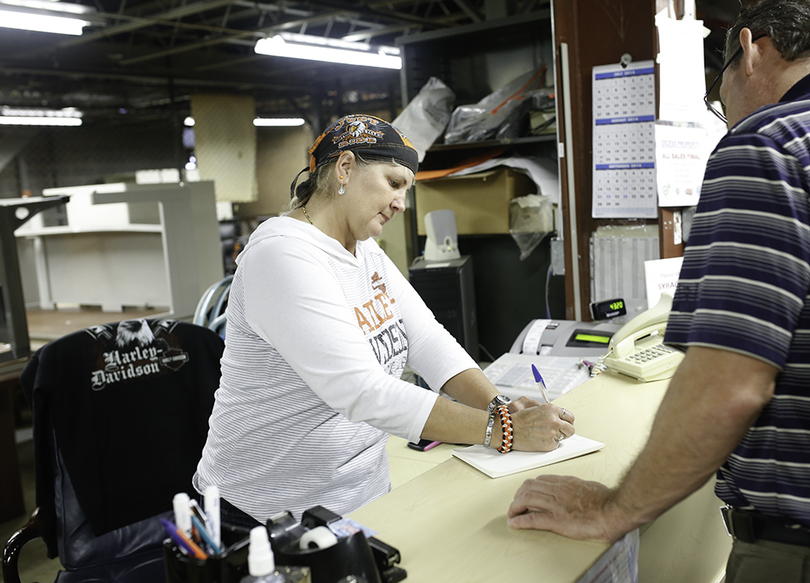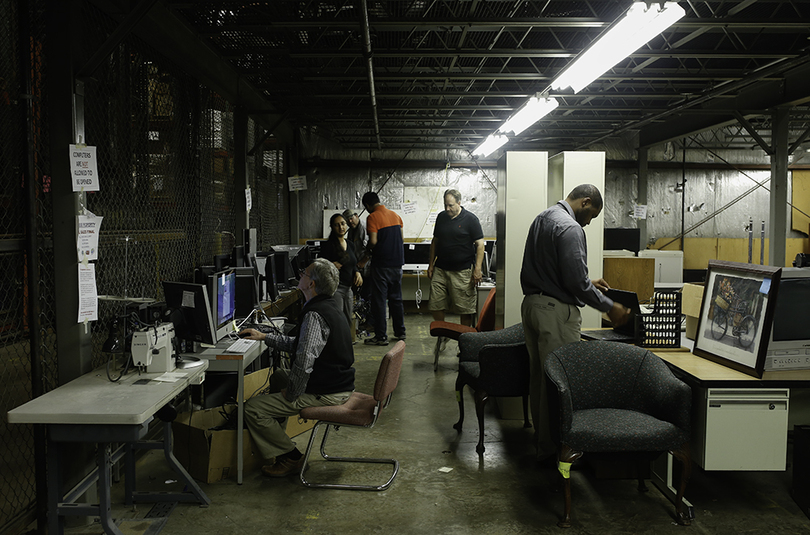Excess Property Store gives new life to used SU furniture, electronics
During her time at the Excess Property Store, Penny Letcher has seen everything from large antique mirrors, nacho chips and a Zamboni ice resurfacer. But there was one item she named above the rest that took her by complete surprise.
“It was wicker, and it had Christmas lights all intertwined through it, and it stood probably 3 feet tall,” Letcher said. “It was kind of strange.”
The reindeer lawn ornament brought in by the Syracuse University commissary is, in Letcher’s opinion, the most out-of-the-ordinary item that she has sold at the store during her five years as its manager and only employee. The store mostly sells a combination of furniture and electronics, though Letcher said she does get odd items outside of those categories once in a while.
The Excess Property Store opens its doors to the public every Wednesday from 8:30 a.m. to 3 p.m. The store itself is hidden within the Hawkins building, a warehouse that Syracuse University uses to store materials for distribution around campus, just about a five minute drive from Main Campus.
The items are assigned prices based on fair market value, which is determined by comparing selling prices of similar items on online sites such as eBay or Craigslist. The money then goes back to the department that brought the items in, Letcher said. But the SU Purchasing Department keeps 5 percent of the money from the sale to account for processing fees.
The eclectic mix of items is sold to a variety of people: students, faculty and individuals from the local community.
Although there are a select group of students who come in around the fall season to stock their new apartments with furniture, it isn’t necessarily the peak season for the store.
“I used to think it was right as school started, but it doesn’t really seem like that anymore. I think it depends on what items are available in there,” Letcher said.
The store was originally created in the late ‘80s, long before Letcher began working as its manager. The concept of the store was created after the Purchasing Department decided to increase the frequency of its sales from annual or semi-annual to daily.
Although it was created out of an increase in supply and demand in the Purchasing Department, Douglas Freeman, Letcher’s boss and director of purchasing and real estate, said that today the store serves more as a way to reuse items and give back to the environment.
“The excess property program was (created) a long time ahead of recycling processes and being green and sustainable, but it really all fits in that,” Freeman said. “It keeps things being used.”
Although the store is run under the Purchasing Department, Letcher handles most of the day-to-day operations as a one-woman show, while also maintaining her role as a purchasing specialist. Freeman monitors the store by checking the activity and sale reports.
Every week, Letcher can expect anywhere between 30–100 people to walk in and out of the store. The amount of people varies based on what sorts of items are available for sale on that particular day.
“There’s days where it’s really slow down there, and there’s days where it’s nonstop,” Letcher said. “If I have nice computers available and the public knows about it, people will line up in the morning before I get here.”
Rose Viviano, director of the downtown gallery ArtRage, is one of the more frequent customers of the store. Last week, she visited the store to buy chairs for her office space.
“We’ve known about this place for years,” Viviano said. “We’ve actually gotten a lot of office equipment including computers from this place.”
The customers can access the majority of the store’s items within its two-tiered location within the warehouse. On its upper floor, a variety of chairs and office furniture parts are displayed in a massive Costco-like formation. On its lower floor, items that have been sold but not picked up yet and a smaller amount of office furniture are arranged.
Occasionally, when items are heavy and difficult to transport, they will be sold directly from the department’s location.
While Letcher does note that the eco-friendly factor of the store is one of the highlights of her job, her favorite part of her job is the relaxed environment and the ability to interact with a variety of people from every walk of life that come in to her store.
“People are usually happy when they come in here,” Letcher said. “I do feel like ‘Dear Abby’ sometimes, though, when people come in and tell me their life stories.”
Published on October 1, 2014 at 12:01 am
Contact Margaret: mglin@syr.edu








